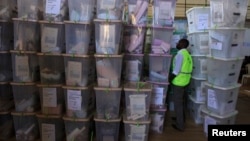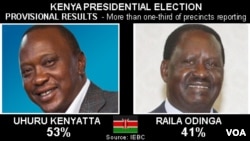NAIROBI —
Election officials in Kenya say a network overload is to blame for the slow tally of votes from Monday's closely-watched presidential election.
While provisional results show Jubilee Alliance candidate Uhuru Kenyatta leading rival candidate Raila Odinga of the CORD alliance with just over 40 percent of votes tallied, Kenya’s electoral commission, the IEBC, has asked Kenyans to be patient. At the heart of the slow vote-counting process is a breakdown in the systems used to transmit votes from polling stations to tallying centers.
According to IEBC Chairman Ahmed Issack Hassan, the commission also concerned about the growing number of rejected ballots.
“Due to the complexity of this election, where six ballot papers were being cast on the same day in six different ballot boxes, we’re beginning to see a trend, which is quite worrying, of a large number of rejected ballot papers,” he said, explaining that by mid-day Tuesday, more than 300,000 ballots had been rejected, which accounts for about six percent of the total number of votes cast.
Political parties contesting the election have expressed their own concerns about irregularities in the vote-counting process.
Odinga's campaign manager Eliud Owalo complained that preliminary totals have come mostly from the opponents’ strongholds, giving what he calls the wrong impression that Kenyatta is winning.
“What we are saying is, it doesn’t reflect the net picture nationwide," Owalo said. "So once results start streaming in from our strongholds, I can assure you we are winning this election in the first round.”
Neither party suggests technical problems could lead to vote rigging or compromise final results.
Oxford University lecturer Nic Cheeseman, an election observer, says the delays may nonetheless create concerns for voters.
“It doesn’t necessarily mean anything about the results," he said. "The results could be completely free and fair and credible, but voter confidence is likely to be reduced because the systems that were sold to them as helping to make sure this is a free and fair election seem to be being undermined.”
Public opinion polls published before the election showed the two front-runners, Kenyatta and Odinga, virtually tied.
If neither candidate wins more than 50 percent of the vote, the race will go to a run-off scheduled for April.
Both parties, however, have said they are confident of a first-round victory.
While provisional results show Jubilee Alliance candidate Uhuru Kenyatta leading rival candidate Raila Odinga of the CORD alliance with just over 40 percent of votes tallied, Kenya’s electoral commission, the IEBC, has asked Kenyans to be patient. At the heart of the slow vote-counting process is a breakdown in the systems used to transmit votes from polling stations to tallying centers.
According to IEBC Chairman Ahmed Issack Hassan, the commission also concerned about the growing number of rejected ballots.
“Due to the complexity of this election, where six ballot papers were being cast on the same day in six different ballot boxes, we’re beginning to see a trend, which is quite worrying, of a large number of rejected ballot papers,” he said, explaining that by mid-day Tuesday, more than 300,000 ballots had been rejected, which accounts for about six percent of the total number of votes cast.
Political parties contesting the election have expressed their own concerns about irregularities in the vote-counting process.
Odinga's campaign manager Eliud Owalo complained that preliminary totals have come mostly from the opponents’ strongholds, giving what he calls the wrong impression that Kenyatta is winning.
“What we are saying is, it doesn’t reflect the net picture nationwide," Owalo said. "So once results start streaming in from our strongholds, I can assure you we are winning this election in the first round.”
Neither party suggests technical problems could lead to vote rigging or compromise final results.
Oxford University lecturer Nic Cheeseman, an election observer, says the delays may nonetheless create concerns for voters.
“It doesn’t necessarily mean anything about the results," he said. "The results could be completely free and fair and credible, but voter confidence is likely to be reduced because the systems that were sold to them as helping to make sure this is a free and fair election seem to be being undermined.”
Public opinion polls published before the election showed the two front-runners, Kenyatta and Odinga, virtually tied.
If neither candidate wins more than 50 percent of the vote, the race will go to a run-off scheduled for April.
Both parties, however, have said they are confident of a first-round victory.





